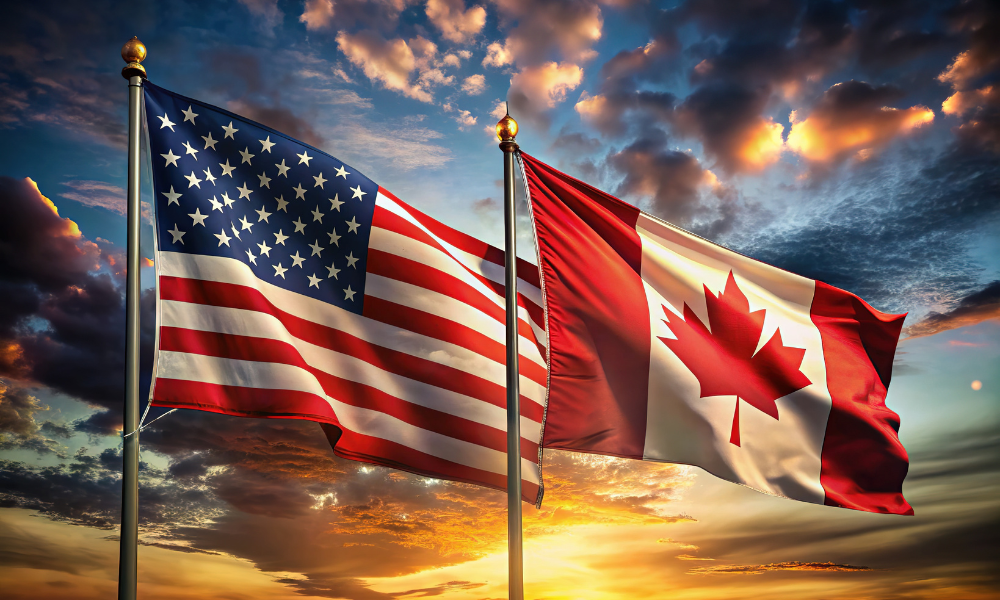Canada avoids new baseline tariffs but warns more could be coming

Canada may have dodged the worst of US president Donald Trump’s sweeping new tariffs, but that hasn’t stopped Prime Minister Mark Carney from retaliating.
While Canadian goods were spared the broadest new levies announced as part of Trump’s “Liberation Day” trade agenda, the inclusion of Canadian-made automobiles in the president’s 25% tariff regime has Ottawa preparing countermeasures.
“We’re going to fight these tariffs with countermeasures. We are going to protect our workers and we are going to build the strongest economy in the G7,” Carney said Wednesday. “In a crisis it’s important to come together and it’s essential to act with purpose and with force, and that’s what we’ll do.”
The announcement comes as the White House rolled out a series of new tariffs on foreign-made goods, including a 25% tariff on all non-US content in foreign-made automobiles, which applies to Canadian-made passenger vehicles. Additionally, a 10% baseline tariff will be applied to goods from many countries, but Canada will be exempt from this baseline, according to a White House fact sheet, due to tariffs already in place.
Last month, Trump imposed a 25% tariff on Canadian goods and 10% on energy, citing concerns over drugs and migrants entering the US via the northern border. Some importers can avoid these tariffs if they can prove compliance with the US-Canada-Mexico Agreement (USMCA).
'Canada will retaliate'
Carney warned that more tariffs could be on the way. He said the White House has signalled that future tariffs could hit strategic sectors like pharmaceuticals, lumber, and semiconductors, all of which play vital roles in Canada’s trade economy.
“The series of measures will directly affect millions of Canadians,” Carney told reporters before entering an emergency cabinet meeting in Ottawa.
Though Trump’s announcement stopped short of applying new across-the-board tariffs on Canadian goods, Carney was clear that Canada will retaliate. However, he indicated that the response would be measured.
“We will not disadvantage Canadian producers and Canadian workers relative to American workers. There are measures we can take that, at a minimum, level the playing field with the US,” he said. “But again, it depends on the broader measures they take tomorrow, if indeed they do, against Canada.”
Read next: Canada's housing market braces for impact as a fresh wave of tariffs looms
The prime minister is expected to meet with Canada’s premiers Thursday to determine next steps, including a formal response to the auto tariffs.
Carney also revealed that he had spoken to Trump last week. Both leaders agreed to launch comprehensive economic and security negotiations following Canada’s April 28 federal election – if Carney retains his position.
Canada already has a list of $155 billion in US goods drafted under former Prime Minister Justin Trudeau as part of earlier retaliation plans. A first wave, totaling $30 billion, is already in effect, and the remainder could be triggered after further public consultation.
Carney did not confirm whether that list would remain the same, saying only that the federal government has “held back” additional retaliatory moves so far.
Canadian leaders respond
Conservative leader Pierre Poilievre expressed hope for resolution but supported Carney’s stance.
“The tariff chaos must end,” Poilievre said. “Until Trump backs off, Ottawa is right to retaliate.”
New Democratic Party (NDP) leader Jagmeet Singh emphasized that any talks with the US must not put public health care “on the negotiating table.”
Singh also pledged to ban foreign takeovers of Canadian health-care assets, particularly by US companies.
In Ontario, Premier Doug Ford warned that Trump’s “Liberation Day” could become a “termination day” for US workers.
“You can't just cut off your largest customer in the world, and that's Canada,” Ford told NBC News. “The only thing acceptable is zero tariffs.”
Ontario opposition leader Marit Stiles echoed that sentiment, saying the province would not “fold under pressure” and has requested a joint strategy meeting with Ford.
Meanwhile, Carney was scheduled to speak with Mexican president Claudia Sheinbaum Wednesday to discuss boosting North American competitiveness and resisting trade actions deemed unfair.
According to a readout, Carney stressed the need to “fight unjustified trade actions against Canada.”
Make sure to get all the latest news to your inbox on Canada’s mortgage and housing markets by signing up for our free daily newsletter here.



